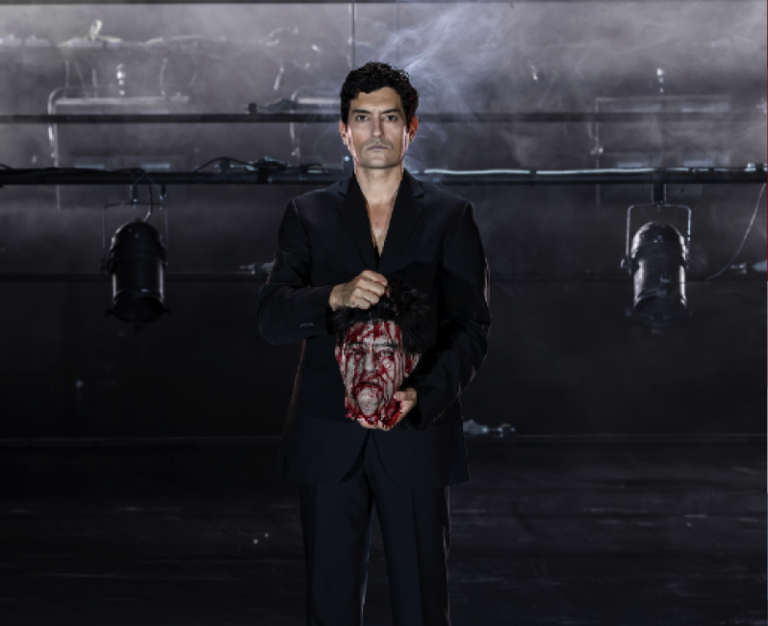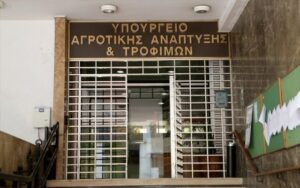A tragedy of mysticism, ecstasy and brutality, Euripides’ “Bacchae”, will be presented by the National Theatre, on Friday 2 and Saturday 3 August, at the Ancient Theatre of Epidaurus, as part of this year’s Athens Epidaurus Festival. The performance will be directed by Thanos Papakonstantinou and will be performed by Konstantinos Avarikiotis, Marianna Demetriou, Alexia Kaltsiki, Themis Panou, Argyris Pantazaras, Yannis Koravos, Dionysis Pifeas and Fotis Strategos.
When the god Dionysus arrives in Thebes, King Pentheus refuses to see his first cousin as a god and forbids the spread of the new religion. His refusal raises the god’s wrath which, in a tragic reversal of persecutor and persecuted, leads Pentheus to annihilation by his own mother.
Euripides writes the Bacchae – the tragedy of the Greeks, the rulers and the people, according to the great Polish theatre theorist and critic Jan Kott – in the third decade of the Peloponnesian War, when history has become obscured. The great tragic poet composed it during the last year of his stay in Macedonia, where he came into contact with the Dionysian cult.
Bringing his fellow citizens for the umpteenth time face to face with the human attitudes he had been criticising throughout his life, Euripides composed a tragedy – one of the few that take the god Dionysus as its subject – about the conflict between god and man, about human virtue and savagery, prudence and error, reason and the horse. For Euripides, when man is taken over by his brutal instincts, when barbarism awakens in him with rage, all social coexistence is nullified; even if it is the cornerstone of society, the mother-child relationship.
It is violence that spells the end of the city-state of Athens. And as tragedy grapples with the essence of human identity – political or individual, with the end of the latter, the Bacchae becomes – in many ways – a drama about the death of ancient tragedy itself.
The director of the performance, Thanos Papaconstantinou, notes: “Euripides writes the Bacchae at the end of the 5th century BC and his life. There he brings back to the stage the god Dionysus, the founder of the genre. The god of the theatre, of otherness, of dismemberment and fusion, of bliss and destruction, sets up a play that Euripides wanted to end with a dismembered body that no one will pick up.
If what is dismembered on stage is the opening to otherness, does this mean that the prospect, through an initiation, a collective act, of opening to the Other, our own and the world’s, is now lost to us? Will our pieces never be connected again? Are we doomed, like Pentheus, to live enclosed in our well-fortified individuality, or else we will be dismembered? Are the bridges that will unite us with each other, with the Other, with the otherness of our feelings, our ideas, our mythical thoughts, with the absurdity within us, with the absurdity of the world, no longer exist? It is only through our skin that there is safety. Whatever is either completely outside us, or completely inside us, will forever remain alien, inviolable, unspoken, unknown, and will therefore be met with violence. Is violence the only language we can understand? A violence that is closed, impenetrable and absolute, a violence that is not open to any kind of initiation in order to unlock it, to understand it, to endure it. The storm of images on the internet, the natural disasters, the bombs, the mutilated bodies and dead children in the media, the lifeless and dead selfies, the uncontrolled flows of data, people, products – can we no longer bear spirituality, transcendence, ascension, because the only god we can understand is the god of the old covenant, the avenger god, the punisher god? Is that who we deserve?
Or is the dismembered body at once a puzzle that can be completed, a construction that shows us its parts, a spectacle? And is it up to us, the viewers, if and how we put it together?”
Ask me anything
Explore related questions





